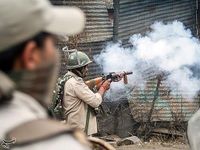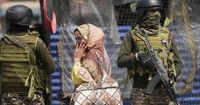The Indian Armed Forces launched a significant military operation early Wednesday, May 7, 2025, targeting nine locations identified as terrorist camps in Pakistan and Pakistan-occupied Kashmir (PoK). Dubbed "Operation Sindoor," this operation marks one of the most expansive retaliatory actions by India in recent years, comparable to the Balakot airstrikes in 2019 and the surgical strikes following the Uri attack in 2016.
The operation was reportedly a response to the April 22 terror attack in Pahalgam, which left 26 individuals dead, primarily Hindu tourists. Among the sites targeted in the strikes were Bahawalpur and Muridke in Pakistan's Punjab province, as well as Muzaffarabad and Kotli in PoK. These locations are known to house terror camps linked to groups such as Jaish-e-Mohammed and Lashkar-e-Taiba, both of which have been implicated in previous attacks against India.
Prior to the strikes, India issued a Notice to Airmen (NOTAM) on May 6, indicating that the Indian Air Force was conducting large-scale military drills along the International Border with Pakistan. The Indian Defence Ministry characterized the strikes as "focused, measured, and non-escalatory in nature," emphasizing that no Pakistani military facilities were targeted.
India's Foreign Secretary, Vikram Misri, stated that the operation was a necessary response to the threats posed by terrorist infrastructure in Pakistan. He explained, "Our intelligence indicated that further attacks against India are impending. Thus, compulsion, both to deter and prevent, necessitated this operation." Misri described the strikes as proportionate and responsible, aimed at dismantling terrorist networks while avoiding broader conflict.
In the aftermath of the strikes, Pakistan's military reported at least 26 casualties and 46 injuries resulting from the attack. Pakistan's Prime Minister, Maryam Nawaz, declared a state of emergency in Punjab province, with all educational institutions closing and security forces placed on high alert. The situation escalated as both nations exchanged fire along their de-facto border in Kashmir, leading to heightened tensions between the two nuclear-armed neighbors.
In a statement, former U.S. President Donald Trump expressed concerns about the escalating conflict, calling the airstrikes "a shame" and hoping for a swift resolution to the fighting. The geopolitical ramifications of the operation have drawn international scrutiny, with analysts questioning the potential for further escalation in hostilities.
Following the airstrikes, Indian Home Minister Amit Shah convened an urgent meeting of chief ministers and security officials from states bordering Pakistan. The meeting aimed to assess the internal security situation and ensure preparedness against any possible retaliatory actions from Pakistan.
In a show of solidarity, families of the victims from the Pahalgam terror attack expressed their support for the military operation. Ashanya Dwivedi, whose husband was killed in the attack, stated, "I believe Modiji will finish what he has started—he won't stop until every terror camp is destroyed." Other widows echoed similar sentiments, framing the military response as a necessary step toward justice.
Colonel Sofiya Qureshi, addressing the media, confirmed the successful execution of Operation Sindoor, stating that the targeted camps were selected based on credible intelligence linking them to cross-border terrorism. Videos presented during the briefing showed the destruction of several camps, including facilities associated with the planning and execution of past attacks.
Despite the Indian government's assertions of restraint and targeted action, Pakistan's Foreign Office condemned the strikes as a violation of its sovereignty and a blatant act of aggression. A statement released by the Foreign Office warned that such actions threaten regional peace and stability and rejected India's justifications for the military operation.
The operation has also led to significant disruptions in air travel, with over 200 flights canceled and at least 18 airports temporarily shut down across northern and western India. Major airlines, including Air India and IndiGo, suspended operations amid the heightened security measures.
As the situation develops, Prime Minister Narendra Modi has postponed a planned three-nation visit to Europe, opting instead to remain in the country to monitor the evolving circumstances. He has held meetings with senior military officials and briefed President Droupadi Murmu on the operation's objectives and outcomes.
While the Indian government maintains that the operation was necessary to uphold national security and deter future attacks, the international community watches closely, concerned about the potential for escalation in a region already fraught with tension. The repercussions of Operation Sindoor will likely resonate beyond the immediate military objectives, influencing diplomatic relations and security dynamics in South Asia for the foreseeable future.






